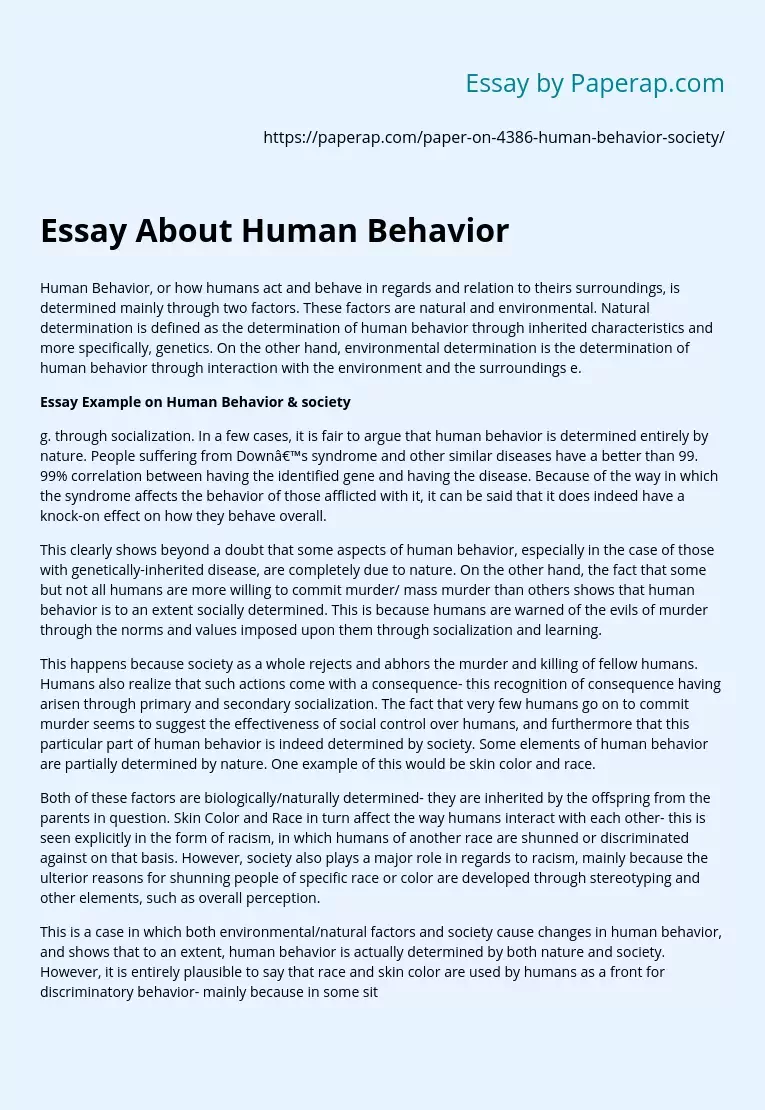Essay About Human Behavior
Human Behavior, or how humans act and behave in regards and relation to theirs surroundings, is determined mainly through two factors. These factors are natural and environmental. Natural determination is defined as the determination of human behavior through inherited characteristics and more specifically, genetics. On the other hand, environmental determination is the determination of human behavior through interaction with the environment and the surroundings e.
Essay Example on Human Behavior & society
g. through socialization. In a few cases, it is fair to argue that human behavior is determined entirely by nature.
People suffering from Down’s syndrome and other similar diseases have a better than 99. 99% correlation between having the identified gene and having the disease. Because of the way in which the syndrome affects the behavior of those afflicted with it, it can be said that it does indeed have a knock-on effect on how they behave overall.
This clearly shows beyond a doubt that some aspects of human behavior, especially in the case of those with genetically-inherited disease, are completely due to nature.
On the other hand, the fact that some but not all humans are more willing to commit murder/ mass murder than others shows that human behavior is to an extent socially determined. This is because humans are warned of the evils of murder through the norms and values imposed upon them through socialization and learning.
This happens because society as a whole rejects and abhors the murder and killing of fellow humans. Humans also realize that such actions come with a consequence- this recognition of consequence having arisen through primary and secondary socialization.
The fact that very few humans go on to commit murder seems to suggest the effectiveness of social control over humans, and furthermore that this particular part of human behavior is indeed determined by society. Some elements of human behavior are partially determined by nature. One example of this would be skin color and race.
Both of these factors are biologically/naturally determined- they are inherited by the offspring from the parents in question. Skin Color and Race in turn affect the way humans interact with each other- this is seen explicitly in the form of racism, in which humans of another race are shunned or discriminated against on that basis. However, society also plays a major role in regards to racism, mainly because the ulterior reasons for shunning people of specific race or color are developed through stereotyping and other elements, such as overall perception.
This is a case in which both environmental/natural factors and society cause changes in human behavior, and shows that to an extent, human behavior is actually determined by both nature and society. However, it is entirely plausible to say that race and skin color are used by humans as a front for discriminatory behavior- mainly because in some situations it is the only main difference or only significant difference between two competing groups of people.
The fact that race is also the only physically visible difference may play a role. Therefore it can be said that skin color is exploited by society or by parts of society for other uses, and that racist behavior as a whole is almost completely determined by society, which skin color and racial differences used as a determinant of difference between two factions. Henceforth, it is possible that although skin color is naturally determined, it does not cause or play a role in human behavior- and instead is used by society.
Essay About Human Behavior. (2019, Nov 27). Retrieved from https://paperap.com/paper-on-4386-human-behavior-society/

